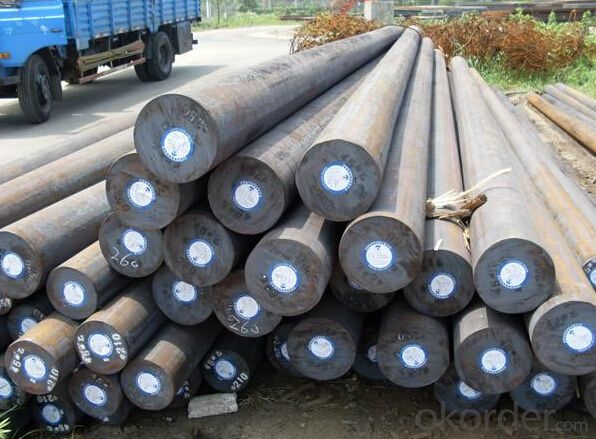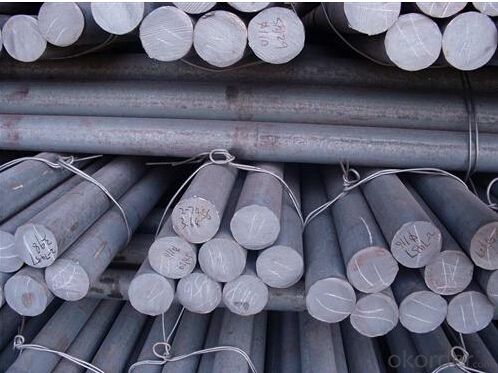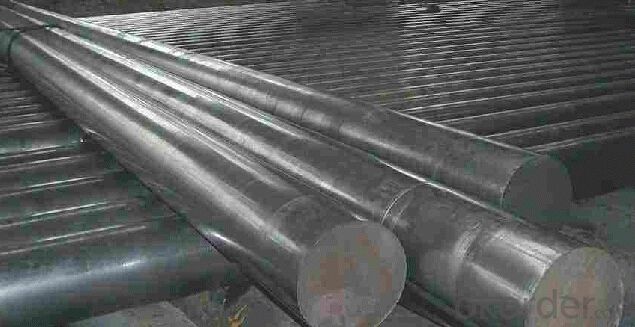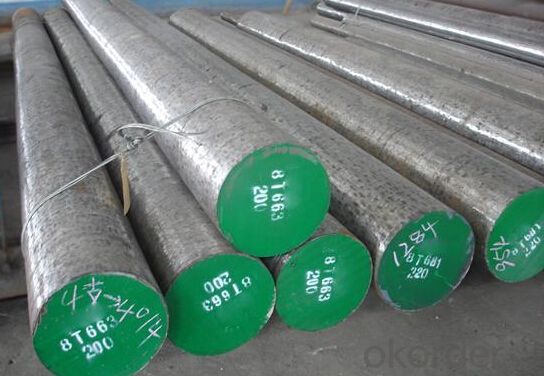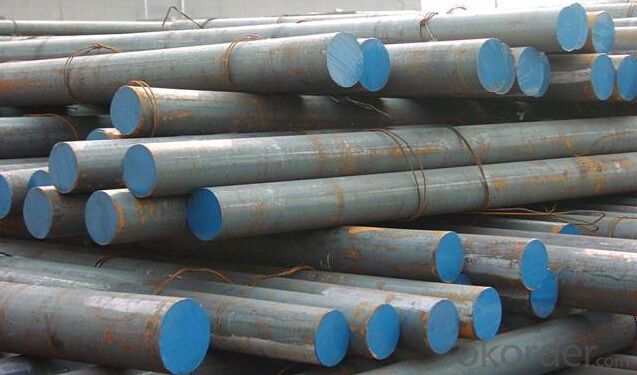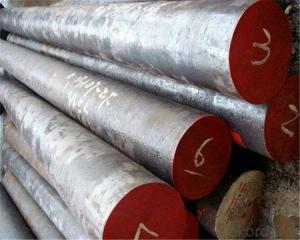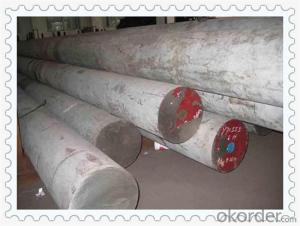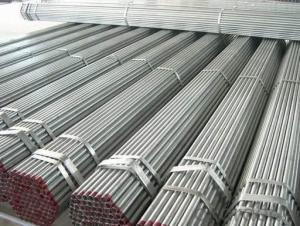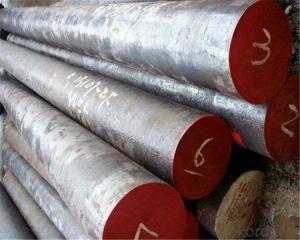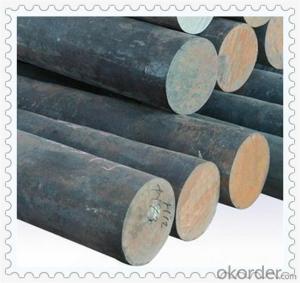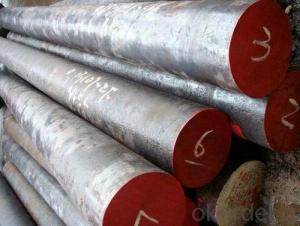Grade AISI 4140,42CrMo, SCM440 Alloy Steel Round Bar
- Loading Port:
- Shanghai
- Payment Terms:
- TT OR LC
- Min Order Qty:
- 30 m.t
- Supply Capability:
- 10000 m.t/month
OKorder Service Pledge
OKorder Financial Service
You Might Also Like
Specification
Specifications of Round Bar
Produce Standard: GB, AISI, ASTM, SAE, EN, BS, DIN, JIS
Produce Processes: Smelt Iron -EAF smelt Billet - ESR smelt Billet -Hot rolled or forged get the steel round bar and plate
Heat Treatment; Normalized / Annealed / Quenched+Tempered
Quality Assurance:All order we can received third party inspection, You can let SGS, BV,.. and others test company test and inspect our products before Goods shipping.
Equivement Grade
GB | 20# | 35# | 45# | 20Cr | 40Cr | 35CrMo | 42CrMo | GCr15 | 60Si2MnA | 65Mn |
AISI | 1020 | 1035 | 1045 | 5120 | 5140 | 4135 | 4140 | 52100 | 9260 | 1065 |
JIS | s20c | s35c | s45c | scr435 | scr440 | scm435 | scm440 | suj2 | sup7 | - |
DIN | c20 | c35 | c45 | 20cr4 | 41cr4 | 35crmo4 | 42crmo4 | 100cr6 | 65si7 |
|
Chemical Composition
Grade | Dia.(mm) | C | Si | Mn | Cr | P | S | Ni | Cu | Mo |
1020 | 16-280 | 0.17-0.25 | 0.17-0.37 | 0.35-0.65 | ≤0.15 | ≤0.035 | ≤0.035 | ≤0.30 | ≤0.25 |
|
1035 | 16-300 | 0.32-0.40 | 0.17-0.37 | 0.50-0.80 | ≤0.25 | ≤0.035 | ≤0.035 | ≤0.25 | ≤0.25 |
|
1045 | 16-430 | 0.42-0.50 | 0.17-0.37 | 0.50-0.80 | ≤0.25 | ≤0.035 | ≤0.035 | ≤0.30 | ≤0.25 |
|
5120 | 16-85 | 0.18-0.24 | 0.17-0.37 | 0.50-0.80 | 0.70-1.00 | ≤0.035 | ≤0.035 | ≤0.03 | ≤0.03 |
|
5140 | 16-400 | 0.37-0.44 | 0.17-0.37 | 0.50-0.80 | 0.80-1.10 | ≤0.035 | ≤0.035 | ≤0.30 | ≤0.03 |
|
4135 | 13-230 | 0.32-0.40 | 0.17-0.37 | 0.40-0.70 | 0.80-1.10 | ≤0.035 | ≤0.035 | ≤0.03 | ≤0.03 | 0.15-0.25 |
4140 | 13-360 | 0.38-0.45 | 0.17-0.37 | 0.50-0.80 | 0.90-1.20 | ≤0.035 | ≤0.035 | ≤0.03 | ≤0.03 | 0.15-0.25 |
52100 | 21-400 | 0.95-1.05 | 0.15-0.35 | 0.20-0.40 | 1.30-1.65 | ≤0.027 | ≤0.02 | ≤0.30 | ≤0.025 | ≤0.10 |
9260 | 20-60 | 0.56-0.60 | 1.50-2.00 | 0.60-0.90 | ≤0.35 | ≤0.035 | ≤0.035 | ≤0.35 | ≤0.20 |
|
1566 | 16-80 | 0.62-0.70 | 0.17-0.37 | 0.90-1.20 | ≤0.25 | ≤0.035 | ≤0.035 | ≤0.30 | ≤0.25 |
|
Our Featured Products
Alloy steel: Combination of steel / Bearing steel// Spring steel/ Cr- mo steel
GB 20Cr/ 40Cr / 42CrMo / 35CrMo/ 20CrMn/GCr15/30CrMnTi…
ASTM 5120 /5140 / 4140/ 4135/ 5152/52100…
JIS SCr420H/ SCr440/ SCM3/ SUP9/SUJ2…
Carbon steel: Carbon tool steel /Carbon Structural Steel
GB 20/ 35 /45/…
ASTM 1020/ 1030/1045…
JIS S20C/ S30C / S45C…
Usage and Applications of Round Bar
1. Chinese standard steel bar is often used where large amounts of steel need to be formed, for example as structural steel.
2. And we can use this kind of product on the performance of the mechanical parts if the demand is not very high.
3. Steel round bar is used in construction and a large number of architectural and engineering structures.
Packaging & Delivery of Round Bar
Packaging Detail: All goods are packed in bundle with steel strips and shipped by break bulk vessel or container (depend on target market and different ports)
Delivery Detail: 15~45 days
Trade terms: FOB, CFR, CIF
MOQ: 30 metric tons per specification; we can negotiate the quantity if the specification is normal or we have stock of one specification.
Weight: Theprice invoicing on theoretical weight basis or actual weight basis depends on customer’s request.
Shipment: The shipment of bulk break or container is depends on customer’s request and the situation of the port of destination.
Documents given: Full set of original clean on board bill of lading; Original signed commercial invoice; Original packing list; Policy of insurance; Certificate of origin and what the target market needs.
FAQ:
Q1: Why buy Materials & Equipment from OKorder.com?
A1: All products offered byOKorder.com are carefully selected from China's most reliable manufacturing enterprises. Through its ISO certifications, OKorder.com adheres to the highest standards and a commitment to supply chain safety and customer satisfaction.
Q2: How do we guarantee the quality of our products?
A2: We have established an advanced quality management system which conducts strict quality tests at every step, from raw materials to the final product. At the same time, we provide extensive follow-up service assurances as required.
Q3: How soon can we receive the product after purchase?
A3: Within three days of placing an order, we will begin production. The specific shipping date is dependent upon international and government factors, but is typically 7 to 10 workdays.
Q4: What makes stainless steel stainless?
A4: Stainless steel must contain at least 10.5 % chromium. It is this element that reacts with the oxygen in the air to form a complex chrome-oxide surface layer that is invisible but strong enough to prevent further oxygen from "staining" (rusting) the surface. Higher levels of chromium and the addition of other alloying elements such as nickel and molybdenum enhance this surface layer and improve the corrosion resistance of the stainless material.
Q5: Can stainless steel rust?
A5: Stainless does not "rust" as you think of regular steel rusting with a red oxide on the surface that flakes off. If you see red rust it is probably due to some iron particles that have contaminated the surface of the stainless steel and it is these iron particles that are rusting. Look at the source of the rusting and see if you can remove it from the surface.
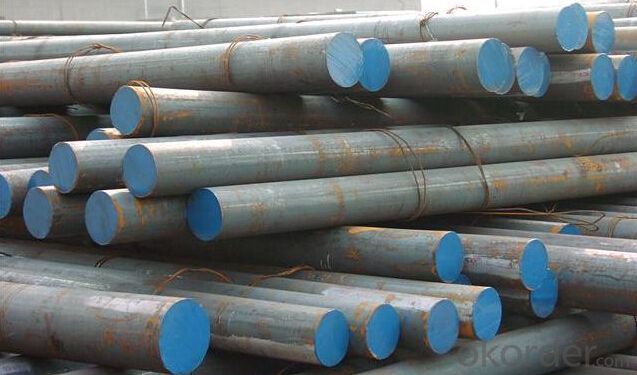
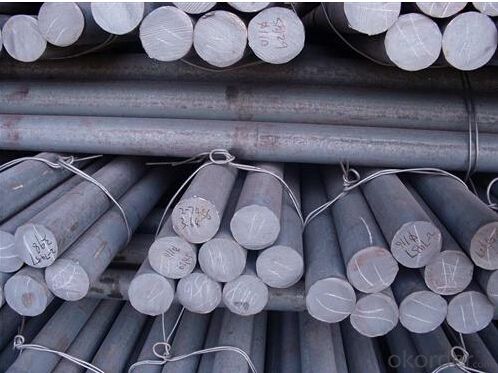
- Q: What are the properties of nickel-based alloys?
- Nickel-based alloys possess several desirable properties, including high strength, excellent corrosion resistance, good thermal stability, and outstanding mechanical properties at elevated temperatures. These alloys also exhibit good electrical conductivity, magnetic properties, and resistance to oxidation. Additionally, nickel-based alloys can be easily fabricated, making them suitable for various applications in industries such as aerospace, automotive, chemical processing, and power generation.
- Q: What is the life cycle of special steel products?
- The life cycle of special steel products typically involves several stages, starting with the extraction and processing of raw materials to create the steel. This is followed by the manufacturing and fabrication processes, where the steel is shaped and formed into the desired product. Once the product is ready, it is typically distributed to customers and used in various applications, such as construction, automotive, or aerospace industries. During its use, the special steel product may undergo regular maintenance, repairs, or modifications to ensure optimal performance. Finally, at the end of its life cycle, the steel product may be recycled or disposed of responsibly, contributing to a more sustainable approach in the industry.
- Q: Can special steel be used in the construction industry?
- Yes, special steel can be used in the construction industry. It offers several advantages such as high strength, durability, and resistance to corrosion, making it suitable for various applications in construction, including beams, columns, and reinforced concrete structures. Special steel can also provide cost-effective solutions by reducing the need for additional materials and maintenance.
- Q: How does cryogenic treatment affect the toughness of special steel?
- The toughness of special steel is greatly affected by cryogenic treatment, which involves subjecting the steel to extremely low temperatures for an extended period. This process has the ability to transform the microstructure of the steel, resulting in improved mechanical properties, including increased toughness. Throughout cryogenic treatment, the steel goes through a process known as martensitic transformation, in which the carbon atoms within the steel lattice rearrange themselves. This transformation leads to the development of additional carbides, which strengthen the steel and enhance its toughness. These carbides act as barriers, hindering crack propagation and improving the steel's resistance to fracture. Additionally, cryogenic treatment reduces the presence of retained austenite, which is a metastable phase in steel that can have detrimental effects on its mechanical properties. The transformation of retained austenite into martensite during cryogenic treatment further enhances the toughness of the steel. The increased toughness achieved through cryogenic treatment makes special steel suitable for various applications that require high strength and resistance to fracture. It improves the steel's ability to endure heavy loads, impacts, and harsh environments. Moreover, cryogenic treatment can enhance the wear resistance and dimensional stability of special steel. It is important to acknowledge that cryogenic treatment alone is not a complete solution for optimizing the toughness of special steel. Other factors, such as the initial composition and heat treatment of the steel, also play a vital role in determining its overall mechanical properties. Therefore, cryogenic treatment should be considered as a complementary process in order to optimize the toughness of special steel.
- Q: Can special steel be used in the pharmaceutical manufacturing equipment manufacturing industry?
- Yes, special steel can be used in the pharmaceutical manufacturing equipment manufacturing industry. Special steel offers several advantages such as resistance to corrosion, high strength, and durability, making it suitable for various applications in pharmaceutical manufacturing equipment. It ensures the hygienic and safe production of pharmaceutical products, meeting the industry's specific requirements and regulations. Additionally, special steel's ability to withstand extreme temperatures and harsh chemicals makes it a valuable material for manufacturing equipment used in pharmaceutical processes.
- Q: What are the different molding grades of special steel?
- Various industries and applications utilize several distinct molding grades of special steel. Some well-known molding grades are: 1. P20: This grade finds wide usage in the production of plastic injection molds, die casting, and extrusion dies. It boasts excellent machinability, high hardness, and good polishability, making it suitable for high-precision molding operations. 2. H13: Primarily used for die casting and forging applications, this grade is a hot work tool steel. It offers high toughness, good heat resistance, and excellent wear resistance, making it suitable for molding processes in high-temperature environments. 3. S7: Commonly employed in molding applications requiring high impact resistance, this grade is a shock-resistant tool steel. It provides good hardness, toughness, and machinability, making it ideal for applications like shear blades and hammer dies. 4. NAK80: Often utilized for high-quality mirror surface molds and precision molding, this grade is a pre-hardened mold steel. It offers high polishability, excellent dimensional stability, and good wear resistance, making it suitable for producing parts with demanding surface finish requirements. 5. 420SS: This grade, a stainless steel, is commonly used in molding applications that require corrosion resistance. It provides good hardness, moderate strength, and excellent corrosion resistance, making it suitable for applications such as medical devices and food processing equipment. These examples represent just a fraction of the available molding grades of special steel on the market. Each grade possesses distinct properties and characteristics that render them suitable for various molding applications. It is crucial to select the appropriate grade based on the specific requirements of the molding process to ensure optimal performance and durability.
- Q: Can special steel be used in the aerospace defense industry?
- Yes, special steel can be used in the aerospace defense industry. It is commonly used for manufacturing various components and structures in aircraft and defense systems due to its high strength, durability, and resistance to extreme temperatures and corrosion.
- Q: What are the main applications of special steel in the food packaging industry?
- Special steel is widely used in the food packaging industry due to its various applications. It is primarily utilized in the production of food cans, closures, and other packaging materials. Special steel offers excellent corrosion resistance, ensuring the preservation and safety of the packaged food. It also provides high strength and durability, maintaining the integrity of the packaging during transportation and storage. Additionally, special steel can be easily formed into different shapes and sizes, allowing for versatile packaging designs. Overall, the main applications of special steel in the food packaging industry include ensuring food safety, promoting product longevity, and enabling creative packaging solutions.
- Q: How is special steel used in the defense supply chain?
- Special steel is used in the defense supply chain for a variety of applications. It is utilized in the manufacturing of military vehicles, aircraft, and naval vessels, providing strength, durability, and resistance to extreme conditions. Special steel is also crucial in the production of weapons and ammunition, ensuring the reliability and effectiveness of these defense systems. Additionally, it plays a vital role in the construction of military infrastructure and equipment, such as bridges, barriers, and armor plating, enhancing their ability to withstand impact, blasts, and other threats.
- Q: How does special steel contribute to improved product aesthetics?
- Improved product aesthetics can be achieved through the use of special steel in various ways. Firstly, special steel can be manufactured with a higher level of precision and consistency compared to regular steel. This enables the production of products with smoother surfaces, sharper edges, and more intricate designs, resulting in a visually pleasing appearance. Furthermore, special steel can be enhanced visually through treatments or coatings. For instance, it can be polished to create a reflective surface, giving the product a luxurious and high-end look. Additionally, special steel can be coated with different colors or finishes, such as chrome or black oxide, to match specific design preferences and create a more visually striking appearance. Moreover, the superior strength and flexibility of special steel allow for unique shaping and forming possibilities. This empowers designers to create products with innovative and complex shapes, contributing to a distinct and eye-catching aesthetic. The ability to mold special steel into various forms also opens up opportunities for intricate patterns, textures, and embossed designs on the product's surface. Lastly, special steel offers excellent corrosion resistance and durability, which helps maintain the product's appearance over time. It prevents rust, staining, and other forms of deterioration that can negatively impact the visual appeal. This long-lasting aesthetic quality is particularly valuable for products exposed to harsh environments or requiring frequent handling. In conclusion, special steel significantly enhances product aesthetics through precision manufacturing, customizable surface treatments, unique shaping capabilities, and long-lasting visual appeal. These qualities allow for the creation of visually appealing products that excel in design, finish, and overall appeal.
Send your message to us
Grade AISI 4140,42CrMo, SCM440 Alloy Steel Round Bar
- Loading Port:
- Shanghai
- Payment Terms:
- TT OR LC
- Min Order Qty:
- 30 m.t
- Supply Capability:
- 10000 m.t/month
OKorder Service Pledge
OKorder Financial Service
Similar products
Hot products
Hot Searches
Related keywords





